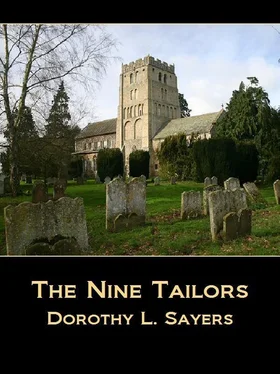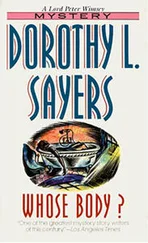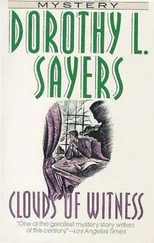Dorothy Sayers - The Nine Tailors
Здесь есть возможность читать онлайн «Dorothy Sayers - The Nine Tailors» весь текст электронной книги совершенно бесплатно (целиком полную версию без сокращений). В некоторых случаях можно слушать аудио, скачать через торрент в формате fb2 и присутствует краткое содержание. Жанр: Классический детектив, на английском языке. Описание произведения, (предисловие) а так же отзывы посетителей доступны на портале библиотеки ЛибКат.
- Название:The Nine Tailors
- Автор:
- Жанр:
- Год:неизвестен
- ISBN:нет данных
- Рейтинг книги:3 / 5. Голосов: 1
-
Избранное:Добавить в избранное
- Отзывы:
-
Ваша оценка:
- 60
- 1
- 2
- 3
- 4
- 5
The Nine Tailors: краткое содержание, описание и аннотация
Предлагаем к чтению аннотацию, описание, краткое содержание или предисловие (зависит от того, что написал сам автор книги «The Nine Tailors»). Если вы не нашли необходимую информацию о книге — напишите в комментариях, мы постараемся отыскать её.
The Nine Tailors — читать онлайн бесплатно полную книгу (весь текст) целиком
Ниже представлен текст книги, разбитый по страницам. Система сохранения места последней прочитанной страницы, позволяет с удобством читать онлайн бесплатно книгу «The Nine Tailors», без необходимости каждый раз заново искать на чём Вы остановились. Поставьте закладку, и сможете в любой момент перейти на страницу, на которой закончили чтение.
Интервал:
Закладка:
“Would you like to stay on and look round? Do you mind locking the door and bringing the key back? It’s Mr. Godfrey’s key — I can’t think where Theodore has put his bunch. It does seem wrong to keep the church locked, but it’s such a solitary place. We can’t keep an eye on it from the Rectory because of the shrubbery and there are sometimes very unpleasant-looking tramps about. I saw a most horrible man go past only the other day, and not so long ago someone broke open the alms-box. That wouldn’t have mattered so much, because there was very little in it, but they did a lot of wanton damage in the sanctuary — out of disappointment, I suppose, and one can’t really allow that, can one?”
Wimsey said, No, one couldn’t, and Yes, he would like to look round the church a little longer and would remember about the key. He spent the first few minutes after the good lady had left him in putting a suitable donation into the alms-box and in examining the font, whose carvings were certainly curious and, to his mind, suggestive of a symbolism neither altogether Christian nor altogether innocent. He noted a heavy old cope-chest beneath the tower, which, on being opened, proved to contain nothing more venerable than a quantity of worn bell-ropes, and passed on into the north aisle, noticing that the corbels supporting the principals of the angel-roof were very appropriately sculptured with cherubs’ heads. He brooded for a little time over the tomb of Abbot Thomas, with its robed and mitred effigy. A stern old boy, he thought, this fourteenth-century cleric, with his strong, harsh face, a ruler rather than a shepherd of his people. Carved panels decorated the sides of the tomb, and showed various scenes in the life of the abbey; one of them depicted the casting of a bell, no doubt of “Batty Thomas,” and it was evident that the Abbot had taken particular pride in his bell, for it appeared again, supporting his feet, in place of the usual cushion. Its decorations and mottoes were realistically rendered: on the shoulder: + NOLI + ESSE + INCREDVLVS + SED + Fidelis +; on the sound-bow: + Abbat Thomas sett mee heare + and bad mee rings both lovd and cleer + 1380 +; and on the waist: O SANCTE THOMA, which inscription, being embellished with an abbot’s mitre, left the spectator in a pleasing uncertainty whether the sanctity was to be attributed to the Apostle or the ecclesiastic. It was as well that Abbot Thomas had died long before the spoliation of his house by King Henry. Thomas would have made a fight for it, and his church might have suffered in the process. His successor, douce man, had meekly acquiesced in the usurpation, leaving his abbey to moulder to decay, and his church to be purified peaceably by the reformers. So, at least, the Rector informed Wimsey over the shepherd’s pie at lunch.
It was only very reluctantly that the Venables consented to let their guest go; but Mr. Brownlow and Mr. Wilderspin between them had made such good progress on the car that it was ready for use by two o’clock, and Wimsey was anxious to press on to Walbeach before dusk set in. He started off, therefore, speeded by many handshakes and much earnest solicitation to come again soon and help to ring another peal. The Rector, at parting, thrust into his hands a copy of Venables on the In and Out of Course, while Mrs. Venables insisted on his drinking an amazingly powerful hot whisky-and-water, to keep the cold out. As the car turned right along the Thirty-foot Bank, Wimsey noticed that the wind had changed. It was hauling round to the south, and, though the snow still lay white and even over the Fen, there was a softness in the air.
“Thaw’s coming, Bunter.”
“Yes, my lord.”
“Ever seen this part of the country when the floods are out?”
“No, my lord.”
“It looks pretty desolate; especially round about the Welney and Mepal Washes, when they let the waters out between the Old and New Bedford Rivers, and across the fen between Over and Earith Bridge. Acres of water, with just a bank running across it here and there or a broken line of willows. Hereabouts I think it’s rather more effectively drained. Ah! look — over to the right — that must be Van Leyden’s Sluice that turns the tide up the Thirty-foot Drain — Denver Sluice again on a smaller scale. Let’s look at the map. Yes, that’s it. See, here’s where the Drain joins the Wale, but it meets it at a higher level; if it wasn’t for the sluice, all the Drain water would turn back up the Wale and flood the whole place. Bad engineering — but the seventeenth-century engineers had to work piecemeal and take things as they found ’em. That’s the Wale, coming down through Potter’s Lode from Fenchurch St. Peter. I shouldn’t care for the sluice-keeper’s job — dashed lonely, I should think.”
They gazed at the ugly little brick house, which stood up quaintly on their right, like a pricked ear, between the two sides of the Sluice. On the one side a weir, with a small lock, spanned the Thirty-foot, where it ran into the Wale six feet above the course of the river. On the other, the upper course of the Wale itself was spanned by a sluice of five gates, which held the Upper Level waters from turning back up the river.
“Not another house within sight — oh, yes — one cottage about two miles further up the bank. Boo! Enough to make one drown one’s self in one’s own lock. Hullo! what happens to the road here? Oh, I see; over the Drain by the bridge and turn sharp right — then follow the river. I do wish everything wasn’t so rectangular in this part of the world. Hoops-a-daisy, over she goes! There’s the sluice-keeper running out to have a look at us. I expect we’re his great event of the day. Let’s wave our hats to him — Hullo’ullo! Cheerio! — I’m all for scattering sunshine as we pass. As Stevenson says, we shall pass this way but once — and I devoutly hope he’s right. Now then, what’s this fellow want?”
Along the bleak white road a solitary figure, plodding towards them, had stopped and extended both arms in appeal. Wimsey slowed the Daimler to a halt.
“Excuse me stopping you, sir,” said the man, civilly enough. “Would you be good enough to tell me if I’m going right for Fenchurch St. Paul?”
“Quite right. Cross the bridge when you come to it and follow the Drain along in the direction you are going till you come to the signpost. You can’t miss it.”
“Thank you, sir. About how far would it be?”
“About five and a half miles to the signpost and then half a mile to the village.”
“Thank you very much, sir.”
“You’ve got a cold walk, I’m afraid.”
“Yes, sir — not a nice part of the country. However, I’ll be there before dark, that’s a comfort.”
He spoke rather low, and his voice had a faint London twang; his drab overcoat, though very shabby, was not ill-cut. He wore a short, dark, pointed beard and seemed to be about fifty years old, but kept his face down when talking as if evading close scrutiny.
“Like a fag?”
“Thank you very much, sir.”
Wimsey shook a few cigarettes out of his case and handed them over. The palm that opened to receive them was calloused, as though by heavy manual labour, but there was nothing of the countryman about the stranger’s manner or appearance.
“You don’t belong to these parts?”
“No. sir.”
“Looking for work?”
“Yes, sir.”
“Labourer?”
“No, sir. Motor mechanic.”
“Oh, I see. Well, good luck to you.”
“Thank you, sir. Good afternoon, sir.”
“Good afternoon.”
Wimsey drove on in silence for about half a mile. Then he said:
“Motor mechanic possibly, but not recently, I think. Stone-quarrying’s more about the size of it. You can always tell an old lag by his eyes, Bunter. Excellent idea to live down the past, and all that, but I hope our friend doesn’t put anything across the good Rector.”
Читать дальшеИнтервал:
Закладка:
Похожие книги на «The Nine Tailors»
Представляем Вашему вниманию похожие книги на «The Nine Tailors» списком для выбора. Мы отобрали схожую по названию и смыслу литературу в надежде предоставить читателям больше вариантов отыскать новые, интересные, ещё непрочитанные произведения.
Обсуждение, отзывы о книге «The Nine Tailors» и просто собственные мнения читателей. Оставьте ваши комментарии, напишите, что Вы думаете о произведении, его смысле или главных героях. Укажите что конкретно понравилось, а что нет, и почему Вы так считаете.












